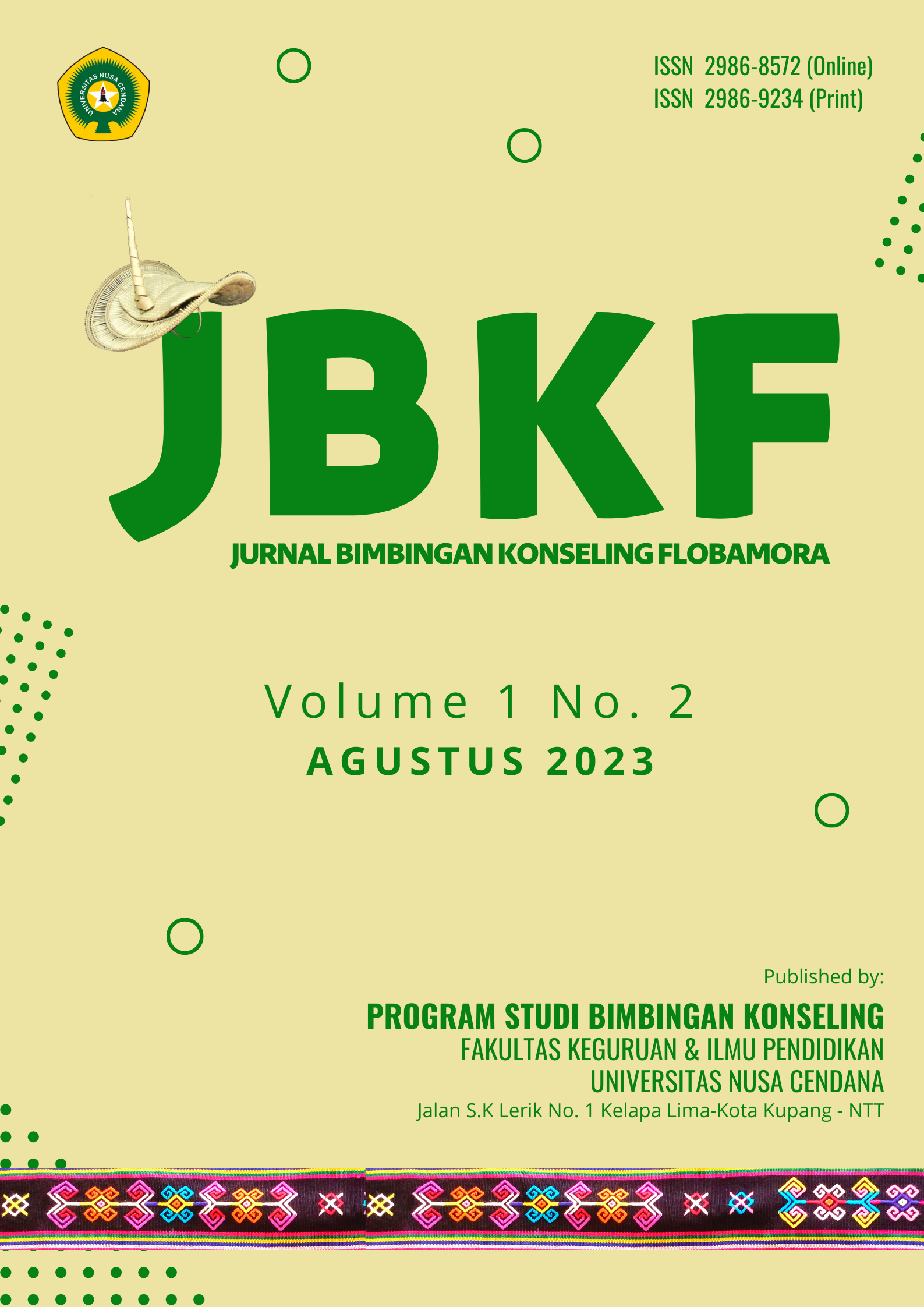Hubungan Antara Intensitas Penggunaan Facebook dengan Kecenderungan Nomophobia Mahasiswa BK Undana
Abstract
The use of facebook and nomophobia has a very negative impact on students. This study aims to determine the description of the intensity of Facebook use with the nomophobia tendency of students, and whether there is a relationship between the intensity of facebook use and the nomophobia tendency of BK Undana students. This research uses a quantitative approach with a type of correlation descriptive research. This research was carried out at the Guidance and Counseling Study Program of FKIP Nusa Cendana University Kupang with a total population of 209 people and a sample of 70 people. The sampling technique used is the purposive sampling method or respondents who have the characteristics of the same criteria. The data collection technique uses a likert scale questionnaire. The data analysis techniques used are descriptive analysis and correlation analysis with the help of the SPPS for Windows 26.00 Version program. The results showed that (I) In general, students using Facebook are in an intermediate presentation, namely 43% for the low category in using Facebook (II) Based on the results of data analysis, the nomophobia tendency of students of the FKIP guidance and counseling study program at Nusa Cendana University is in the low category in the nomophobia tendency with a presentation of 44%. Person product moment correlation analysis shows that between the intensity of facebook use and the tendency to nomophobia has a positive directional relationship shown with an r value of 0.452 The results of the correlation significance test, showed that there was a significant relationship between the intensity of facebook use and the nomophobia tendency of students of the Guidance and Counseling Study Program FKIP Nusa Cendana Kupang University as evidenced by the r-count value > r table (0.452 >0.273). Based on the results of the study, it was concluded that there is a relationship between the intensity of Facebook use and the nomophobia tendency of BK Undana students. The higher the intensity of facebook use, the higher the tendency to nomophobia, on the contrary, the lower the intensity of facebook use, the nomophobia tendency of BK Undana students is also lower.
Downloads
References
Arikunto, S. (2013). Prosedur Penelitian: Suatu Pendekatan Praktik. Jakarta: Rineka Cipta
Asih, A. T., & Fauziah, N. (2017). Hubungan Antara Kontrol Diri Dengan Kecemasan Jauh Dari Smartphone (Nomophobia) Pada Mahasiswa Jurusan Ilmu Komunikasi Fakultas Ilmu Sosial Dan Politik Universitas Diponegoro Semarang. Empati, 6(2), 15–20.
Dewi. W. G (2021). HUBUNGAN KONTROL DIRI DENGAN KECENDERUNGAN NOMOPHOBIA PADA REMAJA DI SMA NEGERI 15 PEKANBARU (Doctoral dissertation, Univesitas Islam Negeri Sultan Syarif Kasim Riau).
Everlena,S.N & Londa,N(2017). Manfaat Jejaring Sosial Facebook Bagi Mahasiswa Asal Papua Yang Kuliah Di Fispol Universitas Sam Ratulangi Manado. Acta Diurna Komunikasi, VI(2), 1–13. https://ejournal.unsrat.ac.id/index.php/actadiurnakomunikasi/article/view/16204
Ginting, F., Ginting, A., Manik, T. A., & Artikel, I. (2022). Hubungan Ketergantungan Penggunaan Smartphone dengan Nomophobia pada Mahasiswa STIKes Santa Elisabeth Medan Tahun 2022. 7(1), 74–80.
Hidayat, S., Suryantoro, H., & Wiratama, J. (2017). Pengaruh Media Sosial Facebook Terhadap Perkembangan E–Commerce Di Indonesia. Simetris : Jurnal Teknik Mesin, Elektro Dan Ilmu Komputer, 8(2), 415. https://doi.org/10.24176/simet.v8i2.1165
Indahwati, R., & Basri, H. (2017). Pengaruh Penggunaan Facebook Sebagai Media Pembelajaran Terhadap Hasil Belajar Mahasiswa. JURNAL SILOGISME : Kajian Ilmu Matematika Dan Pembelajarannya, 2(2), 74. https://doi.org/10.24269/js.v2i2.787
Khahani, N. K., & Lestari, D. S. P. (2019). Jurnal Egaliter, Vol 3 No.5 Oktober 2019. Egaliter, Jurnal, 3(5), 50–67.
Kustijono, R., Sunarti, T., & Budiningarti, H. (2018). Penggunaan Facebook Sebagai Media Inovatif Dalam Pembelajaran Smp Dan Sma Di Perguruan Muhammadiyah Wiyung Surabaya. Jurnal ABDI, 3(2), 68. https://doi.org/10.26740/ja.v3n2.p68-75
Mudrikah, C. (2019). Hubungan antara sindrom FOMO (fear of missing out) dengan kecenderungan nomophobia pada remaja (Doctoral dissertation, UIN Sunan Ampel Surabaya).
Mutia, I., Irfansyah, P., & Widya, L. P. (2016). Pengaruh Jejaring Sosial Facebook Terhadap Prestasi Belajar Mahasiswa Teknik Informatika Di Universitas. Jurnal Edukasi Dan Penelitian Informatika (JEPIN), 2(2), 136–141. https://doi.org/10.26418/jp.v2i2.17632
Nuryani, E. (2014). Hubungan Intensitas Mengakses Facebook dengan Motivasi Belajar Siswa SMA Negeri Tenggarong Seberang. E Journal Ilmu Komunikasi, 2(3), 178–192. http://ejournal.ilkom.fisip-unmul.ac.id/site/wp-content/uploads/2014/08/Jurnal (08-21-14-02-15-26).pdf
Puswati, D., & Sari, N. P. (2021). Hubungan Nomophobia Dengan Konsentrasi Belajar pada Mahasiswa S1 Keperawatan Stikes Payung Negeri Pekanbaru. Health Care : Jurnal Kesehatan, 10(2), 379–384. https://doi.org/10.36763/healthcare.v10i2.165
Ramaita, R., Armaita, A., & Vandelis, P. (2019). Hubungan Ketergantungan Smartphone Dengan Kecemasan (Nomophobia). Jurnal Kesehatan, 10(2), 89. https://doi.org/10.35730/jk.v10i2.399
Rubhan, Apris. (2013). Kontrol diri dan intensitas penggunaan facebook.jurnal online psikologi. Vol. 01 No.02. Universitas Muhammadiyah Malang.
Sari, I. P., Ifdil, I., & Yendi, F. M. (2020). Konsep Nomophobia pada Remaja Generasi Z. JRTI (Jurnal Riset Tindakan Indonesia), 5(1), 21. https://doi.org/10.29210/3003414000
Setiawati, Y., & Fithriyah, I. (2020). Deteksi dini dan penanganan kecanduan gawai pada anak. Airlangga University Press.
Sugiyono. (2013). Metode Penelitian Kuantitatif, Kualitatif dan R&D. Bandung: Alfabeta.CV
Sugiyono. (2017). Metode Penelitian Kuantitatif, Kualitatif, dan R&D. Bandung :Alfabeta, CV.
Sugiyono.(2018).Metode Penelitian Pendidikan Kuantitatif, Kualitatif, dan R&D. Penerbit Alfabeta : Bandung.
Wahyuni, R., & Harmaini, H. (2018). Hubungan Intensitas Menggunakan Facebook dengan Kecenderungan Nomophobia pada Remaja. Jurnal Psikologi, 13(1), 22. https://doi.org/10.24014/jp.v13i1.2717
Yeni,dkk (2018). Penelitian Pendidikan. Prenamedia Group: Jakarta
Copyright (c) 2023 Gabriela A.C Da Costa, Muhamad D Pua Upa, Lolang M Masi, Andriani P Nalle

This work is licensed under a Creative Commons Attribution 4.0 International License.

 Gabriela A.C Da Costa(1*)
Gabriela A.C Da Costa(1*)




.png)

_copy1.jpg)


